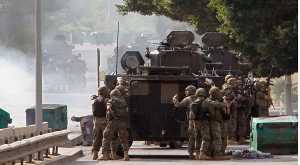Why the assassination of El-Hassan could be a game changer for Lebanon?
By Chadi Abou Daher, Ph.D.
The shock wave that followed the killing of Lebanon’s top chief security intelligence officer, General Wissam El-Hassan, has brought down many additional casualties among which is the political leadership of the March-14 movement. The moment the victim has been identified, the opposition’s public sentiment was more articulate and powerful than its political leadership. These leaders faced the dichotomy of holding on to their pronounced rhetoric and securing a waning international support for the movement’s political agenda.
Calls for the resignation of Najib Mikati’s government by the March-14 movement did not rise up to the demands of the angry demonstrators who proclaimed a much more demanding agenda pointing directly at the presumed Lebanese “perpetrators”. They did not shy away from naming Hezbollah as accomplice in the assassination, hence demanding no less than dismantling of its arms and surrendering those presumed by the Special Tribunal for Lebanon involved in the assassination of late Prime Minister Hariri. Some of the slogans raised in Central Beirut went as far as demanding “Divorce until Justice” which signals a flagrant departure from presumed Lebanese tradition of “co-habitation and dialogue”. The proponents of this position argued that, since 2005, the March-14 movement has been the victim of excessive dialogue which produced no more than the “coercive hijack” by Hezbollah of the Lebanese government, and the continued “bloodshed” of March-14 political symbols through a series of assassinations.
The disconnection between March-14 leadership and the masses was manifested in the surprise and uncoordinated attempt to infiltrate the Grand Serail, headquarter of the Lebanese Government, at the end of the funeral of El-Hassan. The March-14 movement, especially Saad Hariri and his associates, scrambled to control the angry mob attacking the Serail and dissociated themselves from such a plan. They have also expressed their resentments over the aggressive, and sometime military, expressions on the streets of Beirut, Saida, Bekaa, and Tripoli.
Against this background, I argue that the assassination of Al Hassan coupled with the disconnection of March-14 political leadership and its masses will mark the political and security scenes of Lebanon for the months to come.
March-14 Challenged Leadership
There are many reasons to argue that March-14 and March-8 movements have lost their political significance. First, none of the two movements is cohesive. The last few years have witnessed a repositioning of political alliances paving the way for the emergence of a central political grouping aligned with the President of the Republic. Second, the 2005 political polarization that centered on the issue of Syria’s occupation of Lebanon is no more relevant to many political constituencies. Finally, the international and regional scenes have changed considerably and major players are interested in watering down the political tension in Lebanon.
These changing political circumstances necessitated a reshuffling of March-14 priorities toward more moderation and openness which sounded at odd with previously maintained positions. The Governments of Fouad Saniora and Saad Hariri were unable to advance the movement’s political agenda or maintain its unity. The collapse of Saad Hariri’s government elevated public frustration to unprecedented levels. It contributed to the increased radicalization of a considerable portion of his supporters – especially among Sunnis who identified with extremist religious groups. As a result, it became obvious to a large constituency of March-14 that to govern effectively they need political power with teeth, mimicking that of Hezbollah led March-8 movement. This translated in two parallel trends that continue to mark March-14 movement: weakened political leadership and reassessment of means.
This new dynamic has facilitated the rise of local political and religious leaders that are militant in nature and relatively independent from the March-14 political leadership. They have found in the underdeveloped streets of Beirut and other Sunni cities a niche for growth. Although these groups are sympathizing with Hariri’s Future movement and benefit from its social and economic sponsorship, they actually stand for the opposite of what the Future movement represents. The core constituency of the future movement has always been drawn from among the educated middle to upper classes and the rich business community. The rise of local leadership constitutes a serious challenge to this legacy. The ability to maintain a balance between the Future’s political legacy and the rising local leaders is a very delicate process. El-Hasan has played a central role in regulating the relationship between the two. In the aftermath of El-Hasan assassination the leadership of the Future as well as that of March-14 movement are put in jeopardy.
Sunni Militarization
The crisis in Syria has forcefully projected itself into Lebanese politics. It continues to be an alarming development that threatens to spillover ethnic tensions to Lebanon and accentuate the polarization of the country’s fragile politics. The demographics of the Lebanese-Syrian borders quickly transformed the Syrian conflict into a proxy-war between competing Lebanese Sunni and Shiite groups. Villages on the border with Syria became an operational theater for activists supporting the competing Syrian combatants. Fighters’ trafficking and arms’ smuggling by supporters of “Free Syrian Army” invited frequent Syrian’s incursions and raids inside Lebanese territories. On the other hand, Hezbollah is attempting to fence the Lebanese-Syrian borders against Sunni infiltration and is believed to be playing an active operational role in support of the Syrian regime. Whatever the result of the Lebanese muddling in the Syrian conflict would be, there is one obvious consequence to Lebanese politics: the militarization of the March-14 movement.
Actually, militarization came after a series of disappointment with the political processes in Lebanon that prevented March-14 from realizing its “sovereign” agenda in the post-Syrian era. At several events March-8 was perceived as manipulating the political scene through its muscles. This was the case in May 2008 when they took over Beirut in a military operation that ended with the election of a new president. The second was in 2011 when they forced the collapse of Saad Hariri’s government and paved the way for the current Mikati’s one. The self-enforced exile of Saad Hariri is a constant reminder of the fears under which the March-14 movement is living. In such circumstances, pro-militarization rhetoric has been increasingly outspoken especially among the Sunni community.
What is more alarming is the context in which this militarization is taking place: the Sunni-Shiite conflict. In fact, the regional configuration of power has contributed to this trend. While Saudi Arabia has been traditionally the guardian of Sunni interest in Lebanon, the role that Qatar and Turkey are now playing in regional issues is aggravating the situation. Qatar’s role is more significant to Lebanon since it is attempting to project its power into Syrian politics through Lebanese Sunni groups. It is not premature to predict that once the Syrian crisis is over, the focus of these powers would be on facing “Iran’s influence in Lebanon: Hezbollah”. Therefore, the militarization of the Sunnis in Lebanon converges with domestic and regional interests.
In fact, the post-Syrian era in Lebanon has been characterized by the dismantling of the Lebanese-Syrian security apparatus and the building of a new security system dominated by the Sunni-led Internal Security Forces (ISF). El-Hassan role was central to this system along with the head of ISF General Ashraf Rifi. Their success in building a strong intelligence agency that was immune from Syrian influence was the anti-thesis of the militarization rhetoric. In the aftermath of El-Hassan assassination it is no doubt that calls for increasing militarization will be resonating in different Sunni circles. El-Hassan had himself contributed to founding the ground of militarization not only through the construction of local network of intelligence cells, but also through facilitating the arming of these groups. To claim that these groups can be kept under control is highly doubtful especially after the events that followed the assassination of El-Hassan. The emergence of powerful local leaders, the spread of radical religious groups, the mobilization of certain factions in the Palestinian camps, as well as the concentrations of the “Free Syrian Army” in Sunni cities pose an alarming development.
The weakened political leadership of the March-14 movement, especially the Hariri’s Future leadership, together with the rising militarization trend pose an unprecedented challenge to Lebanon’s stability.
Policy Implications
In the realm of political and security dangers, Lebanon’s best bet remains the Lebanese Army. The powerful deployment of the army which restored normality in the aftermath of the violent street manifestations is an assuring step. Yet, the Lebanese Army is not insulated from the influx of sectarian politics. In many instances the Lebanese Army’s freedom of maneuver has been restricted by political calculations. Without political consensus the army is not capable of controlling heavily populated urban centers. The challenge of maintaining the unity of the armed forces is further limiting its options and hindering its ability to enforce order. The recurring fighting between the Sunnis and Alawites in Tripoli is a reminder of the inability of enforcing a sustained ceasefire in the absence of a political solution. In several instances, the army’s role was reduced to restraining the combatants which entailed negotiating with entrenched militant groups. Although this compromise entails a tacit recognition of the power of militant groups, it is considered a necessary price for maintaining the unity of the army and protecting civilians.
Yet, in the absence of a political solution for the militarization trend, the long-term consequences of cohabitation with military groups can be devastating. Aware of such danger, the Lebanese President works at facilitating a political consensus that could end the political impasse and save the country another unnecessary civil strife. Judging from history, such a consensus is hard to reach without powerful external sponsors. Although the international and regional conditions are unfavorable of escalating the situation in Lebanon, the conditions are not ripe for an internationally sponsored consensus.
What would it take to get to such favorable conditions? In the best scenario Lebanon can just wait until regional conditions improve, and pray that internal frictions remain under control. The status-quo can prove to be a better alternative than a full-scale confrontation that would aim at accelerating an international agreement over the Lebanese issue. An all-time rule is that starting a war is easier than finishing it.


Pingback: Lebanon’s Game Changer « Chadi ABOUDAHER
Reblogged this on Chadi ABOUDAHER and commented:
Sunni Radicalization and militarization: is the war in Lebanon unavoidable?
LikeLike
Though I disagree with some hypothesis thoughts, yet I agree with most. Still it’s well done. I fully agree with your analysis in your closing paragraph. Thanks
LikeLike